I met Philip Gounis in Saint Louis at The Stables pub where my writing group The (Un)Stable Writers was meeting weekly. We hit it off immediately and have been best buds since.
He is the 1st person who interviewed me, so I thought he would be the perfect person to launch Featured Artists Interviews on our Travel Artists Hub Podcast because who doesn’t want to hear the interviewee interviewing the interviewer.
Philip is a phenomenal published poet, journalist, archivist, filmmaker, publisher, concert and book reviewer, and editor living in Saint Louis, Missouri, USA. He has been a monumental influence on the writing community nationally and internationally.
He has produced and hosted a series of radio shows and has interviewed many interesting and famous artists throughout his career. We talked to him about all of this and more…
Travel Artists Hub: So, Phil what is your artistic focus?
Philip Gounis: You know, I think we would have to keep coming back to basic curiosity. Why do you do what you do? What techniques have you learned to do what you do? Where did you go to learn these techniques? Who influenced you to want to become a painter, or a sculptor or a musician or a poet?
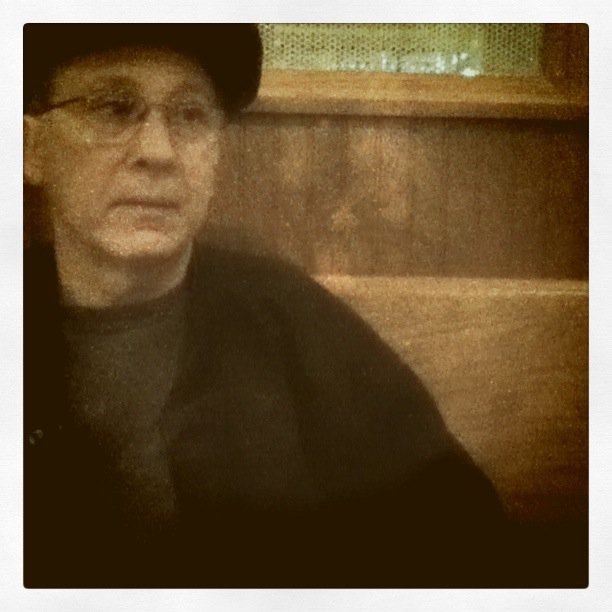
If you are a writer, what are some of the early books that influenced you and made you think Oh, I can do that. Oh, I want to do that. If it was, let’s say, Mark Twain, like it was with me—one of my early influences. How far did you pursue that? Did you go to Hannibal? Did you kind of dig into the whole culture of steamboats and so forth?
Because see that’s the thing about being a curious person. When you find out what makes other people tick you find out what makes you tick. That’s the joy of it. Plus, the whole concept of learning technique, whether it’s playing guitar or writing or filmmaking or whatever. Those things open up a whole panorama of human qualities.
If I am going to be a good filmmaker, I’m going to have to not only to be a good researcher–I’m going to have to see a lot movies. You know, I’m going to learn discipline. I’m going to have to maybe get up and lose some sleep. You know what I mean. It makes you a better, at least a more fulfilled person, if you pursue your art. It’s just going to, it’s just going to make you a more fulfilled person.
TAH: And your art is, the actual art that you create is what?
PG: I would say the written word. Still, I love the internet because I’m still, I’ll never stop trying to find the origins of words, where they came from and what they mean to different people. I’m really lucky, I have a friend that lives in Romania, and she is a real Bukowski fan, and we Skype like this. And she went to school in London, so I don’t know if that did it or what. She said they learned English even in grade school.
What I’m getting at is that she has an amazing, to me an amazing grasp of American idioms and so forth. She loves Bukowski and she totally gets all the idioms and all the slang and everything. So, that kind of thing really interests me. Where they (words) came from. What they mean to different people fluid in a Romanian or in any other language.
I know a little bit of Spanish. I can recognize a little bit of French. I was just listening to Edith Piaff tonight. I just love the sound of the words. I didn’t know what she was saying and yet there was a beauty just to her phrasing and to her inflections and all. So, I love other languages but I’m not fluent in any other language besides English.
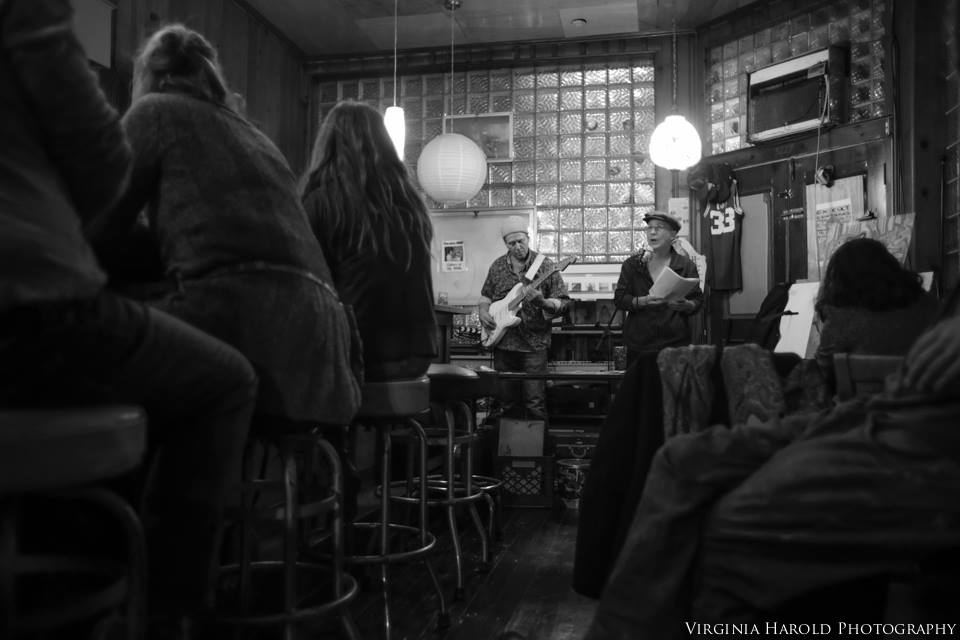
TAH: So, poetry is your focus but you have written other things besides poetry as well?
PG: I’ve done book reviews, a lot of interviews and a lot of essays, expository essays. And again, I really enjoy the interviews that I’ve done because again back to that curiosity thing. It’s easy for me because I’m just a… So, in my head right now I’m cataloging some of the people that I have interviewed.
Even though I might not know everything there is to know about a particular writer or have read everything by them. And maybe those would be the best interviews. But, just give me enough of a taste of what they do and you know think I come up with a pretty readable interview. I interviewed a woman named, Diane Middlebrook, who was Anne Sexton’s biographer.
TAH: Wow!
PG: Yeah, Anne Sexton died in 1974 and I interviewed Diane Middlebrook in 1992 when she had just, her biography of Sexton had just gone into paperback and so she was available to promote it and talk about it and so forth. She was a really charming woman and a poet herself. So, there I was really lucky because here I was able to talk to a researcher.
She (Diane Wood Middlebrook) had went through Sexton’s notes and clippings and talked to Linda Sexton, and Linda’s sister and had done a lot of research on Anne Sexton. And in fact, when the book first came out in hardback got into a little bit of controversy because Anne Sexton’s psychoanalyst had opened up his files to her. And it started to drift into this realm of psychiatric ethics. Even though she has passed away, is this ok to be making these files public?
Because there is an incredible amount of, as you can image, an incredible amount of personal intimate information about Anne Sexton–and her life, and her family, and her marriage, and her sexual appetite, her–all kinds of things. A patient or a client would tell the psychiatrist all that was in…
The psychiatrist had recorded these things; it was audio and he let Diane Middlebrook have access to them. So, it became something of a controversy. But, I thought Diane Middlebrook was discrete about it and scholarly, and professional, and it wasn’t sorted at all.
TAH: I remember that whole thing happening. Is that the person that you feel most sticks in your mind? I mean, you have so many. Who is your favorite person you have ever interviewed?
PG: I don’t have a one favorite, Kristin. Things like this pop up–I’m going to tell you about a little incident. My niece’s son, he’s a, I guess twenty-nine now. I hadn’t seen him in a long time, so I was over at my brother’s house—he’s living with my brother now who is a few years older than me. So, Matt’s twenty-nine or so and I have to say I don’t really know him that well.
I know he’s a good kid. You know, I see him at family get-togethers and so forth. This is the kind of thing; you say what is the favorite? So, we go to pick Matt up from work and I hadn’t seen him maybe in at least a year or two. He comes out, “Hi Uncle Phil, I really enjoyed your Ram Dass interview.”
And you know, I had no idea, we had never talked about Buddhism. We had never talked about Richard Albert or Ram Dass or Hinduism or anything. And my silly brother didn’t say, “Oh yeah, I turned Matt on to one of your interviews.” You know so that kind of stuff, things come out of left field like that all the time.
I’m trying to think of another incident, where someone said, “I saw you did this online” or “I found out you did this.” I get a big kick out of it because if they enjoy it then I enjoy them enjoying it. So, I don’t have just one interview. Ram Dass was certainly, so I talked to him twice. And it was certainly was illuminating.
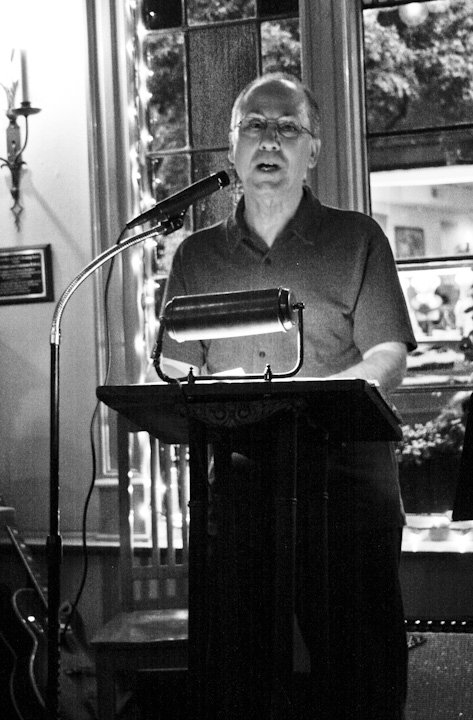
Again, another one of these interviews where he talked about so much and so many people that it kind of spring boarded me into looking into other things. Including Hinduism, John and Yoko’s life in New York City, because he had talked about that. Jerry Ruben, who was an activist in the ’60s and then became a Wall Street broker. Ram Dass talked about all these people so it springboarded me into looking into it. So, that was one of them and that was early, that was 1986 or something, early in my interviewing.
And then I tried to set up a formatted, a formal interview with William Burroughs when he was here in Saint Louis at the Elliot Smith Gallery. And somehow it never came to fruition. He died before we were able to do it. He was kind of in ill health when he was here but I enjoyed meeting him because I had read so much about him. He had been such an influence on so many people and he was extremely cordial, accommodating to me in the few minutes we got to spend together.
So, he stands out, Ram Dass, Diane Middlebrook, Timothy Leary–these are interesting people. The thing about them when your hanging with them or talking to them or whatever. You realize they are an embodiment of all these kinds of adventures and misadventures, as in Leary’s situation.
So yeah, I couldn’t just pick one, Kristin. Uh, I would say the 1960s are a decade that I think people are still feeling the fallout and vibrations from and reverberations from. So, a lot of these what were considered, to use the terminology, a lot of these heavyweights or heavy-duty people from the ’60s were really interesting to talk to and to meet and to find out about.
Because that was a decade there was a lot of moving and shaking like I said, that still influences us politically, culturally, even economically in some ways. So, those are the people that I found myself pretty well versed in, enough to go talk to.
You know, I would enjoy Stephen Hawking but I doubt if I would have been able to talk more than maybe an hour or so. You know, actually as soon as I say it… he would have been infinitely interesting to talk to. We wouldn’t have had to talk physics. Just– How do you deal with expressing yourself? How do you deal with getting these extremely abstract notions expressed? So yeah, I guess that would have been a good one.
TAH: I love it! So, when did you originally start writing?
PG: I always did, Kristin.
TAH: Really?
Yes. Again, I kid my older brother about, I say You taught me how to read. You know, by the time I went to school I knew how to read. And I did because, you know, I grew up in the ’50s and so comic books were a big big deal and he, you know, is 4 years older than me. So, when he would bring home Batman, Robin and all this, you know, there was no way I was just going to look at the pictures. I went, What did he say there? What is that little a, you know, language bubble have in it?
So, you know, I learned to read early. And then again as soon I learned to read, these things were so stimulating for my imagination that him and I started to make our own comic books. So now I’m drawing and writing the language bubbles and the whole thing. So, then we would staple them together. You know it was always something.
Write songs. Over the years, I have been lucky to know a lot of people that play music, so collaborate with songs, write poems, write comic strips. So, always something.
Yeah, as long as I could hold a pencil. So, even now put a pencil, give me a pencil and put a blank piece of paper in front of me and I’ll come up with something just almost like automatic writing. It’s just an impulse—it’s just an impulse.
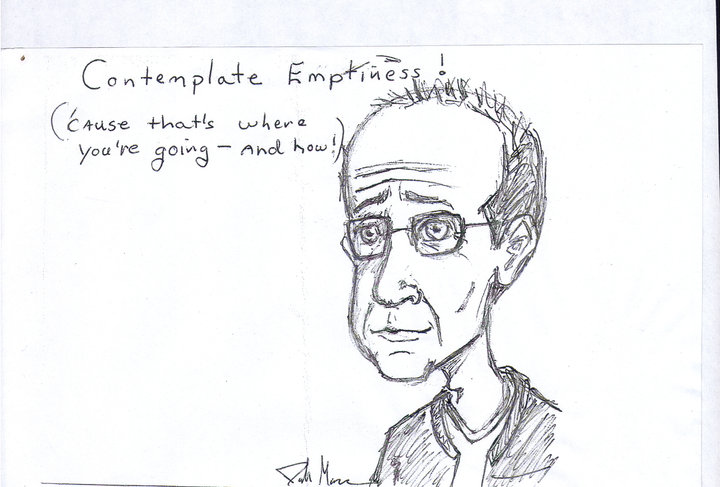
Yeah. So, the answer to that one is age 3, age 5, something like that I started to make those comic strips. Then, you know, then always the other things, you know, you write little poems to your mother at Mother’s Day and your first girlfriend in 1st grade. I was lucky that I had that natural ability, so I’m doing it.
Then as I’m growing up in the ’50s there was this big youth explosion in the culture of people like Jack Kerouac, Allen Ginsberg and the music thing with Elvis, you know. So, there’s this big explosion of young people being creative and that immediately, you know, I was a precocious kid anyway. You know, if you can imagine, you’ve seen the (television) program “Leave It to Beaver” with Larry Mathers, if you can image Larry Mathers with a ducktail and greasy hair and stuff. You know, that stuff was so exciting.
There’s an interview online, Riverfront Times (Saint Louis), I did when my 2nd chapbook came out. And the headline reads, “Phil Gounis talks about Bob Dylan and the Beats” or something like that. (“Philip Gounis on Poetry, Youtube and Bob Dylan”) So, read that one and it will give you a good idea of all the things I am talking about. It will give you an idea of how really exciting a time that was for us.
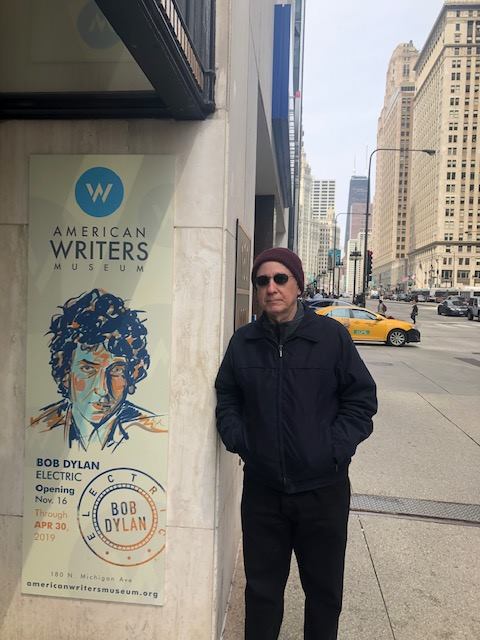
In some ways, it was really limited when you look at the accessibility now with the internet that people have but on the other hand, it was an event. It was a big event if Little Richard would come out with a new record. Or if “Rebel Without a Cause” was at the local (movie) theatre. It was a big event. You going? I’m going? You want to go this weekend? You know it was an event, so those were exciting times and really stimulating times for us, yeah.
TAH: I can imagine because it was a complete diversion from the… What’s the word I’m looking for? Like a kind of, I don’t know, Puritan ideas of the ’50s, right?
PG: Exactly, we can flashback on Anne Sexton just for a minute. She’s such, again, the embodiment and the epitome of a woman that was extremely creative but was maturing and growing up in a time when women were supposed to be that term “housewife” –that’s a horrible term. I can relate to and kind of get “homemaker”… but “housewife”? I’m married to my house—no.
Especially a woman like Anne Sexton, it literally drove her crazy. You know, being trapped by the era she was in, so her psychiatrist, that same psychiatrist who opened up her files after her death, turned her on to writing poetry. And even without a college degree, she won a Pulitzer Prize. She was an extremely talented woman.
Yeah, like I said it was the 50’s, “Leave It to Beaver” like I said, and “Father Knows Best”, and women in the kitchen with an apron and stuff. That’s not right—no.
TAH: How old were you when that (the change in the ’50s) kind of hit?
PG: I was born in 1948, so but like I said I was a precocious kid, so that whole James Dean, Rock n’ Roll, Elvis. All that was breaking loose when I was about 8 or 10 years old.
TAH: Oh, so it was just starting and you like hit it right at the perfect time.
PG: Kind of did. It was kind of perfect. The ’60s was the same way. In some ways, I was really really fortunate. Uh, so you know, I had mentioned the 60’s as a really definitive decade but kind of the whole last 50 years of the 20th century are loaded.
There’s a lot of stuff, again that word “definitive” things happening. Hiroshima, Nagasaki in ’45 and then you go into the ’50s, the whole idea of the Cold War, then the Kennedy years, then the whole drug culture, and the war—there’s a lot happening in there. Like I said, we are still feeling the reverberations from.
TAH: Do you travel for your writing?
PG: Well, you know, I did. I went out to the West Coast to see Timothy Leary, went to Naropa University in Denver to see Michael McClure and Allen Ginsberg. Went to New York City to interview Yoko Ono but again it didn’t come to fruition.
A kind of funny story in that I got into the basement of The Dakota, walked right past the security guard like I was supposed to be there. And this was in… This was after John’s assassination. This was in a, 19 (pause) 1990, so it was 10 years after John’s death. And I was able actually… what I did was I put a request in Yoko Ono’s mailbox in the basement of The Dakota but she did not end up granting the interview—as strange as that might go.
I then ran into her, again this is totally by chance, ran into at a night club where Timothy Leary was appearing in San Francisco in 1988, calling himself a standup philosopher. And she, Yoko, was in the audience and so I kind of reintroduced myself to her, but she wasn’t doing interviews, she was just there to see Tim Leary.
TAH: Oh darn! Wahhh… At least you got to meet her.
PG: Yeah, interesting person. Again, that would be a great interview for you.
TAH: Yeah, but maybe you should try to still get an interviewer with her.
PG: Yeah. She’s an Aquarian maybe it will work out sometime. I gave her my astrological horoscope, the whole sketch, and stuff. I put it in with my cover letter, but it still didn’t work out. They actually hired people according to their astrological sign. I knew for a fact that she had already done that, yeah.
*Philip Gounis Interview – Part 2 – Coming Soon*
Listen to Philip’s poem “He Got Out” Poem on Youtube:
He Got Out
He said that the sun practiced in solitude
before it burned in public
He spoke in tongues before anyone else did
He made living in the men’s room of the Greyhound bus depot
with his back up against the wall
Sang Hank William’s songs
He told his parish priest to get up off his knees
and act like a man
He burned hamburgers at the Rob Roy Pancake House
until he couldn’t stand the singe
His father a malevolent looking Lash LaRue
locked him in for days
He bar hopped with his mother
and documented the traces of his subconscious
He turned his soul inside out inside jail
Fooled the guards
Cracked the walls
Bent the bars
Then escaped into a prison of isolation
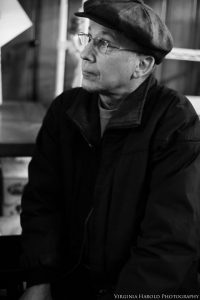
Philip Gounis is a poet, literary journalist, archivist, filmmaker, publisher, editor, concert and book reviewer. Phil is a renowned radio broadcaster and he has served as both host, co-host and producer. Most notably, the weekly blues program Crackerbox, poetry & music show Verbatim, the talky shows Off The Beaten Path, Poetry Beat and Literature for the Halibut on KDHX FM.
Phil co-founded the magazine of politics and popular culture, Steamshovel Press (1988). He released, Form Matters, a poetry + blues guitar collaboration with musician Rich Kruse (Intangible Studios, 2005).
Phil is the author of two chapbooks of poetry, Some of These Have Appeared (2007) and Upgrading the Allusion (JK Publishing, 2011). He has participated in various Saint Louis literary & music shows and events including River Stix, Soulard Culture Squad, Get Born, Chance Operations, Poems, Prose and Pints, 100 Thousand Poets for Change and Brick City Poetry Festival–just to name a few. His work has appeared in a variety of literary publications and entertainment magazines.
Check out Philip’s website and purchase his chapbooks at http://philipgounis.com
Connect with Philip on Facebook
Read Philip’s interviews and video:
Philip’s River Front Times STL Interview “Philip Gounis on Poetry, Youtube and Bob Dylan”
Philip’s Interview with Diane Wood Middlebrook
“Form Matters” Album available at:
Click here to check out Philip Gounis’ poem “dispensing with protection”